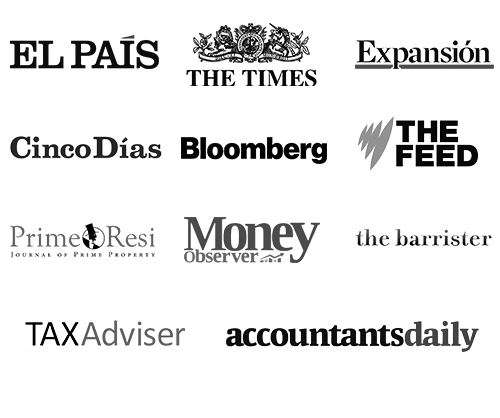Owning Spanish property via an international company. Previously, we have the reviewed the history of property ownership through companies in Spain. The structure emerged in the last decades of the past century as an advantageous method for the country to attract foreign investors; and for these investors to avoid excessive taxes. However, in recent years, Spanish legislation and regulations have converged with the European Union’s understanding of aggressive tax planning. This has translated into an increase in inspections for the thousands of British citizens and other expats who hold properties in Spain through corporations.
More recently, there have been substantial refinements to tax inspection plans, which will probably increase due to the need for government revenue in these times of economic instability. These inspections are very attractive because the tax structures were designed to benefit wealthy individuals with high-value properties. The exemptions and advantages they offer are not that suitable for regular expats who own properties in Spain. Problematically, many of these structures were established in years when regulations were weaker and inspections less frequent.
In fact, a brief review of current legislation will highlight the need to check and update owners of Spanish properties through corporate structures.
Recent changes in tax inspection plans for corporate-owned properties in Spain
First of all, make sure that you check the previous post about the topic of corporate-owned real estate in Spain. After reading it, these are the changes that were last announced by the tax inspection plan in Spain for 2019.
The plan highlights the prevalence of foreign expats employing opaque corporate layers to acquire and maintain properties. As an antidote, the tax authority seeks to employ the principle of ultimate beneficial owner and its registry to identify who is actually benefiting from the use of this real estate. As commented on our previous publication, the registry follows two European Union Directives from 2018. These Directives instruct Spanish firms to be transparent about the ultimate owner on the yearly tax return. In terms of ownership, this refers to shareholders possessing at least a quarter of total capital.
Therefore, in addition to strengthened links between tax authorities in Spain and other jurisdictions, the registry allows inspectors to link companies directly with taxpayers. No prior consent is necessary for the exchange of information on this matter between countries which have signed the relevant agreements. As an example, a year into the use of this new tool led to the discovery of more than 100,000 companies exclusively dedicated to the ownership of Spanish assets. Only a tenth of those are likely to be property owning structures; but, for the reasons mentioned above, they are particularly attractive candidates for investigation.
While in the previous post some tax advisors were unfairly accused of malpractice in the past, it is true that the profession today is firmly committed to the fight against fraud. This is partly the result of the EU Directive 2018/843, which enlists all types of advisors, auditors, lawyers and other experts who advise on tax matters to take care of compliance. In fact, the UK government holds responsible those experts who aid in tax evasion, regardless of whether this evasion affects Britain or any other nation.
There are two conclusions from this recent changes in legislation:
- Tax advisors are responsible for ensuring that they have kept their clients up to date, and that their property-holding structures are compliant.
- Tax advisors are also responsible for responding to queries by national governments and can be held accountable for participating in illicit activities.
Many firms are unprepared for the degree of due process needed to respect these two goals. At Del Canto Chambers, we have always pursued our clients needs without compromising in compliance, or quality. Our continued work across multinational jurisdictions has turned us into experts at preventing and reacting to sudden regulatory changes. As a result, whatever Spanish authorities do in the future, you are better off trusting firms like ours, which can review your case early on to prevent any worries. We are also one of the few expert firms operating in Spain, but with equally substantial ties to the rest of the world.
Why is this awareness of the Spanish context particularly important? Well, because Spanish tax inspections operate on a ‘shoot first, ask questions later’ basis. Owners of this corporate structures are known to be wealthy, and inspectors are hoping that they will simply pay to avoid conflict. The presence of the tax agency in private residential areas around Marbella or Madrid is enough to stress many owners. Moreover, authorities are quick to assess and demand high penalties, with the expectation that this will deter owners from challenging the outcome of the investigation. In the end, these property owners with corporate structures are seen as easy targets to generate revenue.
Main issues in corporate-owned real estate for tax inspectors in Spain
Considering this renewed attention by tax inspectors, our team has concluded that they will be particularly focused on the following aspects:
- Undeclared VAT.
- Lack of compliance with local tourism regulations, particularly in the case of Airbnb.
- Undeclared rents generated by properties owned by companies.
- Lack of compliance with established corporate regulations in Spain: accurate accounts, annual tax returns (including ownership and management disclosure).
- Lack of compliance with share capital and loan regulations; thin capitalisation is used as a guide to assess companies.
- Undeclared transfers to foreign shareholders.
- Lack of submission of form 720 regarding the ownership of foreign assets.
- Lack of arms’ length provisions for the payment of interest on loans.
- Lack of consideration for transfer taxes for selling assets, within and outside Spain.
- Allowances or depreciations affecting capital must be described according to tax regulations in Spain.
- Capital allowances and depreciation could reduce the capital gains tax on a company, but these need to be accounted for in accordance with Spanish tax rules.
- Lack of consideration for double tax treaties, which require that individuals pay non-resident tax.
- Misreporting of trusts, financial vehicles which are not recognised in Spain and must be reviewed following both Spanish and British law.
- Misreporting or lack of reporting for the ultimate beneficial owner in company and other commercial documents.
All of these mean that, whatever the case, non-resident foreign property owners in Spain will have to pay taxes in the country. Of course, the actual nature and quantities of the taxes paid will be determined by the particular corporate structure and asset types. What matters is that clients, particularly those with longtime transnational assets, examine their structures with an expert. For instance, there are many jurisdictions that used to be considered tax havens which today actively share their information with Spanish authorities. Reviewing their situation with a firm like Del Canto Chambers will help them find out whether their structures are actually legitimate, or whether they should fear a tax inspection coming their way.
Finally, the increasing complexity and diversity of issues related to the acquisition of real state through corporations perhaps suggests that it is time for a change. The mechanism is not as effective as it used to be in avoiding exposure to taxation in Spain. As a result, our team can also help you assess whether you could benefit from a different arrangement to protect you and your family’s assets from tax inspections and other risks.
Owning Spanish property via international company. By Del Canto Chambers
Contact Us
Del Canto Chambers is a leading London Chambers specialising in intellectual property, tax, international tax and legal affairs, property law and legal advocacy.
If you would like to speak to an expert about registering or protecting a trademark, please ring us.
To make a no-obligation enquiry, please either call us now on:
+44 2070 430648 or Make An Online Enquiry.
We will come back to you within 24 hours and we will be delighted to help you.





